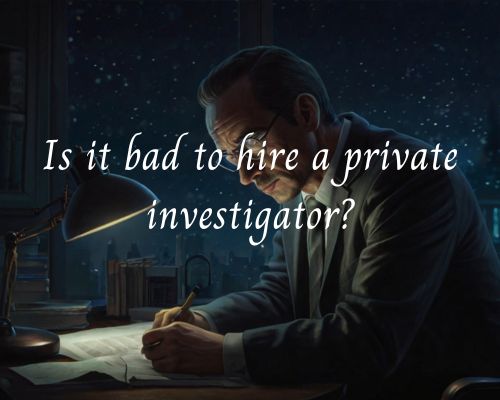Hiring a private investigator can be a sensitive topic for many people. You may be wondering if it is ethical or legal to hire someone to investigate another person. In some cases, hiring a private investigator can be beneficial, but in others, it may do more harm than good. For more understanding about this, let us dig more with Sherlock Holmes of Ali Private Investigator Tampa.

Private investigators are professionals who are hired to gather information about a person, business, or organization. They use a variety of techniques, such as surveillance, background checks, and interviews, to obtain the information their clients need.
Private investigators are often hired by individuals who suspect their partner of cheating, businesses who suspect their employees of fraud, or attorneys who need to gather evidence for a case. However, it is important to note that hiring a private investigator is not always legal, and there are certain restrictions on what they can and cannot do.
If you are considering hiring a private investigator, it is important to weigh the pros and cons. On the one hand, a private investigator can provide you with valuable information that you may not be able to obtain on your own. They can help you uncover the truth about a person or situation, and provide you with evidence that can be used in court.
On the other hand, hiring a private investigator can be expensive, and there is no guarantee that they will be able to provide you with the information you need. Additionally, if the private investigator engages in illegal or unethical behavior, you could be held liable for their actions.
Understanding the Role of a Private Investigator
If you are considering hiring a private investigator, it is important to understand their role in the investigation process.
Private investigators are professionals who are hired to gather information and conduct investigations on behalf of their clients. They are trained and experienced in various investigative methods and techniques that allow them to gather information efficiently and effectively.
Licensing and Legal Compliance
Private investigators are required to be licensed in most states. The licensing process involves meeting certain requirements, such as background checks and completing a training program.
It is important to hire a licensed private investigator to ensure that they are operating within legal boundaries and are held to ethical and professional standards.
Scope of Investigations
Private investigators can be hired for a wide range of investigations, including background checks, missing person cases, divorce cases, child custody cases, and asset searches.
They can also be hired by businesses to conduct investigations related to fraud, theft, or other legal issues.
Private investigators like Ali Private Investigator Tampa, are trained to conduct surveillance, gather evidence, and provide their clients with the information they need to make informed decisions.
Ethical Considerations and Professional Standards
Private investigators are held to ethical and professional standards, which include maintaining confidentiality, respecting privacy issues, and conducting investigations in a legal and ethical manner.
They are required to follow state laws and regulations, as well as the ethical standards set forth by their profession.
Private investigators must also maintain open communication with their clients and keep them informed of the progress of the investigation.
Evaluating the Risks and Benefits of Hiring a Private Investigator
If you are considering hiring a private investigator, it is important to evaluate the potential risks and benefits before making a decision.
Potential Risks and How to Mitigate Them
Hiring the wrong private investigator can result in wasted time, money, and even legal trouble. It is important to do your research and choose a licensed and reputable investigator with a proven track record.
You can ask for referrals from trusted sources, such as attorneys or law enforcement officers, and check reviews and credentials before making a decision.
Another potential risk is the gathering of illegal or inadmissible evidence.
A reputable investigator will always comply with legal and ethical guidelines and will not engage in illegal activities or provide you with information that is not admissible in court.
You should also make sure that the investigator is licensed and insured to protect yourself from any liabilities.
Maximizing the Benefits of Hiring the Right Investigator
When you hire the right private investigator, you can benefit from their expertise, network, and work product.
A skilled investigator can gather information that is difficult or impossible for you to obtain on your own, such as financial information, personal matters, or conducting surveillance.
They can also provide you with valuable insights and advice based on their experience and knowledge.
To maximize the benefits of hiring a private investigator, you should be clear about your goals and expectations and provide them with all the relevant information and documentation.
You should also communicate openly and regularly with the investigator and ask for updates and feedback.
A reputable investigator will keep you informed throughout the process and provide you with a final report that is clear, detailed, and reliable.
Costs and Practical Considerations
One of the main practical considerations when hiring a private investigator is the cost. Private investigators are typically expensive. Their fees can vary depending on the complexity of the case, the location, and other factors.
You should ask for a detailed estimate and payment terms before hiring an investigator. Make sure that you can afford the costs.
Another consideration is the privacy and confidentiality of the investigation. A reputable investigator will always uphold strict confidentiality protocols and protect the privacy of all parties involved.
You should also be aware of the potential risks of conducting surveillance or gathering information without proper authorization or legal compliance.


